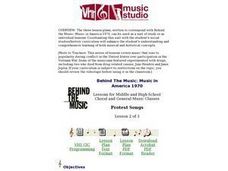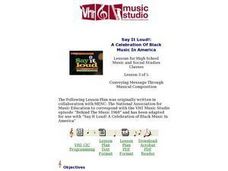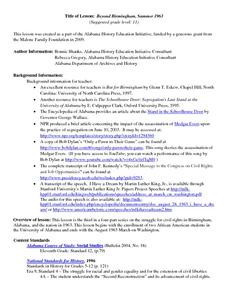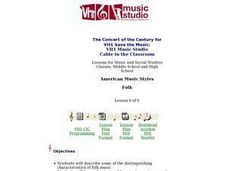PBS
Breaking the Code: Actions and Songs of Protest
Ezell Blair, Jr., David Richmond, Franklin McCain and Joseph McNeil changed history. Their sit-in at the lunch counter of the Woolworths in Greensboro, North Carolina on February 1, 1960 became a model for the nonviolent protests that...
Curated OER
The War of the Words
“Who’s This Guy Dylan Who’s Borrowing Lines From Henry Timrod?” The basic question in this lesson from the New York Time’s Learning Network is whether artists and authors who use the words of others are stealing from that artist or...
Mississippi Department of Archives and History
Protesting Violence without Violence
The ultimate legacy of Emmett Till's violent death is its role in the non-violent roots of the Civil Rights Movement. A lesson compares contemporaneous articles with the lyrics of Bob Dylan's "The Death of Emmett Till" and prompts...
PBS
The Sixties: Dylan Plugs in and Sells Out
Before Woodstock, there was Newport. Get plugged in to the social changes of the 1960s with a lesson that looks at Bob Dylan's performance at the 1965 Newport Folk Festival as a symbol of the radical changes that marked the era.
Curated OER
1960's Protest Songs
By learning about 1960's protest songs, and the politics of the era, students can broaden their understanding of music and history.
Curated OER
Breaking the Code: Actions and Songs of Protest
Students listen to and discuss the purpose of protest music. They analyze an editorial cartoon related to Jim Crow and read questions from the literacy tests given to African-Americans. They work together to write a song about the...
Curated OER
Protest Songs
Students analyze and perform an American social protest song. They describe its historical setting, consider the effectiveness of the music and recognize that popular music is a reflection of American culture.
Curated OER
Conveying Message Through Musical Composition
Students listen to and discuss various protest songs from the 1960's, and write original lyrics for a song addressing global or societal issues. They write a paragraph evaluating the efficacy of the song to convey a message.
Curated OER
Music: A Nation's Voice
Students investigate the impact of popular music in 1960's America. For this music and history lesson, students listen to several identified songs from the decade and analyze their lyrics. Students discuss their impressions and then...
Alabama Department of Archives and History
Beyond Birmingham, Summer 1963
The assassination of Medgar Evers. The integration of the University of Alabama. The March on Washington. The "I Have a Dream" speech. Created by the Alabama History Education Initiative, this resource examines how the events that...
Curated OER
Protest Music of the 60's
Students demonstrate their knowlege about protest music of the late sixties by creating miniature protest signs.
Curated OER
Sing a Tale
This activity allows students to explore the elements of traditional folktales in folk music.
Curated OER
Folk
Students read about Woody Guthrie and how folk music often tells of events of the time and can be effective protest music.














